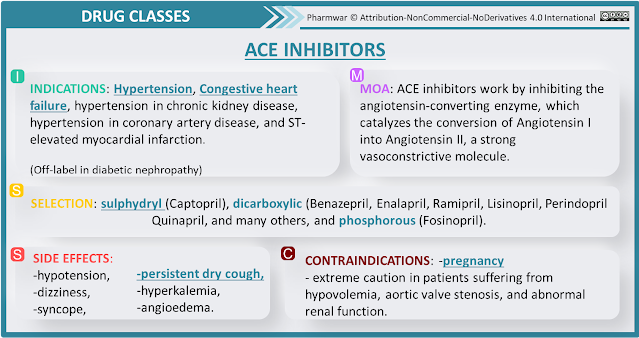ACE inhibitors are a class of medications used to treat hypertension, congestive heart failure, hypertension in chronic kidney disease, hypertension in coronary artery disease, and ST-elevated myocardial infarction. Off-label use of ACE inhibitors is in diabetic nephropathy.
ACE inhibitors work by inhibiting the angiotensin-converting
enzyme, which catalyzes the conversion of Angiotensin I into Angiotensin II, a
strong vasoconstrictive molecule.
There are three types of ACE inhibitors: sulphydryl (Captopril),
dicarboxylic (Benazepril, Enalapril, Ramipril, Lisinopril, Perindopril
Quinapril, and many others, and phosphorous (Fosinopril).
The only ACE inhibitor that is available as an IV injection
is Enalapril. ACE inhibitors are mostly pro-drugs, the only two which don’t
need to be activated are Lisinopril and Captopril.
Side effects of ACE inhibitors include hypotension,
dizziness, syncope, persistent dry cough, hyperkalemia, and angioedema.
ACE inhibitors are contraindicated in pregnancy and should
be used with extreme caution in patients suffering from hypovolemia aortic
valve stenosis, and abnormal renal function.
NSAIDs may decrease the hypotensive effect of ACE
inhibitors, and other antihypertensive medications may increase the risk of
hypotension and hyperkalemia. Potassium supplements and food rich in potassium
may increase the risk of hyperkalemia.

Comments
Post a Comment